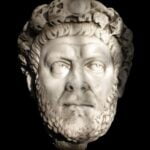In 390 CE emperor Theodosius I, at the instigation of the Church, issued a bill under which every homosexual act is to be punished: “When a man marries [a man] as a woman offering herself to men (quum vir nubit in feminam viris porrecturam), what can he be seeking, where gender has lost its place; when the crime is one which it is not profitable to know; when Venus is changed to another form; when love is sought and not found? We order the statutes to arise, the laws to be armed with an avenging sword, that those infamous persons who are now, or who hereafter may be, guilty may be subjected to exquisite punishment”.
At the time when the law came into force Butheric’s cupbea – Balkan provincial commander and army commander, he was seduced by a circus coachman popular in Thessalonica, who according to the new law was detained. At the same time, local games were approaching, so the people insistently demanded the release of the coachman. Riots broke out during which Butheric was stoned to death.
News of these events enraged the emperor, who gave a secret order to punish Thessalonians. A cordon of soldiers surrounded a hippodrome filled with spectators during the competition. The emperor tried to cancel the order but too late – 7,000 to 15,000 people were murdered.
The Bishop of Ambrose excommunicated Theodosius: “you appeared to me in a dream to have come into the Church, and I was not permitted to offer the sacrifice. I pass over other things, which I could have avoided, but I bore them for love of you, as I believe. May the Lord cause all things to pass peaceably. Our God gives warnings in many ways, by heavenly signs, by the precepts of the prophets; by the visions even of sinners He wills that we should understand, that we should entreat Him to take away all disturbances, to preserve peace for you emperors, that the faith and peace of the Church, whose advantage it is that emperors should be Christians and devout, may continue”.
This was not the first clash of Theodosius I with Bishop Ambrose. Two years earlier in 388, the bishop in Kallinikum on the Euphrates prompted the faithful to destroy the local synagogue and the heretical “Valentinian” temple. Theodosius, wanting to maintain the status of religious peace, had the destroyed temples rebuilt, which was met with opposition from Ambroży. The bishop, being an experienced politician, forced his vision of the empire. The empire was to be subordinated to church authority. The empire was to be the guarantor of God’s order on Earth.
During the Holy Mass in the cathedral in Milan, Ambroży publicly accused the emperor of apostasy and threatened that if he did not withdraw his edict regarding the synagogue and the “Valentinian” temple and did not give the perpetrators of the destruction of the amnesty, he would not give the emperor the Eucharist. Theodosius capitulated, despite the protest of imperial supporters.
In the case of Thessalonica, the emperor opposed the church by issuing a number of anti-church laws and appointing consuls to declared pagans. Ultimately, however, he bowed to the bishop of Milan and in December he did penance in a medieval style. According to historians from the era, during the time of penance, the sinner stands in a separate and visible place for others, after the service he falls on his face and moans waiting for the bishop’s sign. Then he goes away and mortifies himself for some time, as recommended by the priest, e.g. starving himself or living in the dirt.
Two months later, on February 24, 391, an act was introduced which in practice cancels the functioning of the old faith in any way. Ambrose’s doctrine came true: one emperor and one faith.
After the emperor’s death in 395, Ambrose said in his funeral speech:
He, an emperor, was not ashamed to do the public penance which lesser individuals shrink from, and to the end of his life he never ceased to grieve for his error.
Ambrose’s vision of the world was beginning to be a reality.







